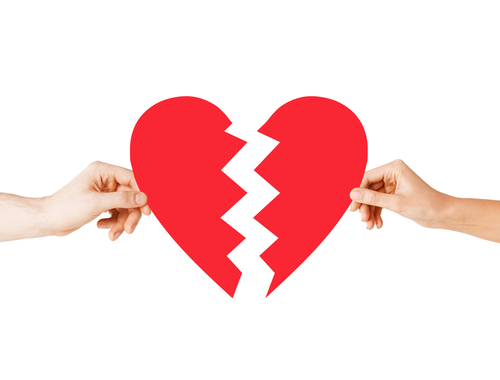How to Get Over a Breakup
November 3, 2018 - Reading time: 14 minutes
The Unusual and Surprising Difference Between the Grieving Processes of Men and Women
Getting over a break-up is extremely hard. Whether you are the one doing the breaking up, or the one getting dumped, extracting yourself from someone else's life is a complicated and painful process. It doesn't happen overnight, either. The post-relationship transition from sadness to acceptance can be a long and difficult road. Below, we'll discuss the differences between how men and women cope with the end of a relationship.
Breakup Pains (and Break Up Advice)
If you've ever been through a break-up, you know how hard it is to avoid thinking about things like "what went wrong", "what do I do now", and "how will I ever move on?". But is your significant other thinking the same things? You may be surprised to learn that they have a completely different set of concerns and priorities post-breakup. Whether we like to admit it or not, these post-breakup differences seem to split among gender lines.
Rebuilding Self-Esteem and Avoiding Social Stigma
Women often worry about suffering a drop in their social status as a result of a breakup, especially if they're the "dumpee" instead of the "dumper". This can lead to temporary dips in their self-confidence, their sense of self-worth, and a fear of being socially stigmatized after a breakup. Generally speaking, there's more societal pressure on women (as opposed to men) to find a mate. So "single" women fear they may be perceived as unwanted, unloveable, or defective, making it difficult or impossible to ever find love again.
But women have an advantage over men when it comes to these thoughts: friends and family. Women seek the company of loved ones early and often in order to cope with these negative feelings after a breakup. Regardless of gender, friends and family tend to be emotionally supportive and helpful for boosting confidence and offering consolation in times of distress. This helps restore emotional well-being and expedite the grieving process for the vast majority of women.
On the flip side, seeking solace from friends and family is one of the last things you'll catch a man doing post-breakup. This is a sad, true fact of most men's lives for various reasons. One, social stigma compels a majority of men to feel like they're not allowed to be vulnerable or show any type of emotion, much less sadness. They tend to keep their feelings to themselves instead of talking it out. Secondly, a "single" man isn't seen as defective or worthless by society's standards.
Bachelorhood carries no stigma with it, and is even revered in most modern cultures. But that doesn't mean men don't experience a perceived drop in self-worth or self-esteem after a breakup. However, men tend to deal with these feelings through either thrill-seeking behavior, an uptick in sexual activity, and/or other potentially dangerous actions.
Living in the Past Vs. Living in the Present
Men tend to "get busy" after a breakup. Whether it's working with their hands, funneling all their energy into their job, or something similar, directing their thoughts and energy towards something else helps them distract themselves from the pain. In a way, this "living in the moment" philosophy can have similar benefits to those of meditation. However, if the underlying pain never gets addressed, this can cause men more emotional harm than good over the long-term.
Instead of getting busy, women tend to spend a lot of time reflecting on what went wrong in the relationship. But this isn't always the best way to handle the situation. Yes, performing some honest self-reflection and figuring out what mistakes may have been made (even if the only mistake was "choosing someone who didn't deserve me") can be productive and yield personal growth. But for women who can't stop thinking about it or ruminating on their pain, it can pave a swift and perilous road right into the heart of the danger zone. These types of obsessive thoughts can cause neurological changes in the brain which, if left unchecked, could develop into depression.

So Who Suffers More Post Break-Up: Women, or Men?
This is another side to the battle of the sexes which has been raging on for quite a while now. Obviously, each side believes that they suffer more, and each one has their own arguments for why this is true. But is it really so cut and dry? Or is the answer to this question more nuanced than people think?
Why Getting Over a Break up Is Hard for Men
Pop culture would have us believe that it's effortlessly easy for a man to hop from one relationship to the next. In reality, however, this simply isn't the case. There's a funny little chemical called vasopressin which partly accounts for why men don't seek emotional support from or confide in others after a breakup. Vasopressin, among other things, is known as the "bonding" hormone. The few mammal species that are naturally monogamous have some of the highest vasopressin levels compared to more promiscuous animals. Since bonding chemicals in the brain are obviously highest when you're in a committed relationship, they will likely stay that way for a long time even after the relationship is over. In women, vasopressin has a different effect: it makes them see other people - fellow women especially - as easily approachable. This makes it easier for them to seek out the company of others, as discussed above.
But that's not all vasopressin does to a man's brain both during and after a relationship. This neurotransmitter is also associated with feelings of familiarity, safety, and belonging. For lack of a better metaphor, men who have recently ended a relationship (whether proactively or unwillingly) feel emotionally homeless. Over time, this can actually lead to negative consequences for their physical health. Tons of studies show that when a man is suffering from chronic depression, which is entirely possible post-breakup, it can practically shut down his immune system. This is one of the main reasons men tend to get hospitalized more often and die sooner than females.
Why Getting Over Breakup Is Hard for Women
For starters, women tend to invest a lot of physical, emotional, and even financial resources into a relationship. Because of this, they may neglect their fitness needs because they're more concerned about spending time taking care of their significant other than taking time for themselves. Women can easily become emotionally dependent or even codependent on their significant other, often to the detriment of their other personal relationships. Women are also more likely to forgo financial opportunities to stay geographically close to their partner, avoid causing them emotional/economic insecurity, or to stay home and take care of the children. So while men may feel "emotionally homeless" after a breakup, it's much more likely to happen to a woman in a very literal sense.

Love Is Like a Drug...Literally!
Going through a breakup can be as painful and as difficult as kicking a heroin habit. We're not exaggerating. If anything, that may actually be an understatement. Neurologically speaking, both opiate drugs and romantic pair-bonding increase dopamine levels in the brain. To get the same high from either a person or a drug, you need to constantly expose yourself to the triggering stimulus more and more. But a romantic relationship does something to your brain that drugs can never do: they throw oxytocin and vasopressin into the mix. We discussed earlier how vasopressin is the "bonding" hormone. Similarly, oxytocin is the "love" hormone. So when someone you're bonded to - someone who makes you feel love and joy - is suddenly no longer in your life, it's basically genocide for the endorphins in your brain.
If you really want to successfully get over a breakup, going through a "detox" period may be the best medicine. It's the fastest way for your brain to deconstruct the neural connections between memories of your ex and feelings of love, comfort, and joy. Within reason, whether male or female, you should do everything in your power to follow the "out of sight, out of mind" rule. If you can't bring yourself to throw away pictures or other material things which remind you of them, lock them away somewhere where you won't have to see them every single day and be confronted with the pain all over again. Also, be sure to get plenty of good, quality sleep. REM sleep is especially important during such a delicate time. This is when the brain restructures itself to become more resilient and less susceptible to the emotional pain of losing your partner. If you don't believe us, just ask your friendly neighborhood neuroscientist. He or she will back us up.
We know breakups can be hard. Everyone is going to go through one at some point in life. But the more you understand about what happens to both men and women post break-up, the easier it will be to heal.
